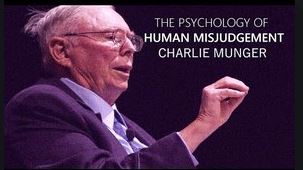Cognitive Distortions
The Psychology of Human Misjudgment
With valuable insights from Charlie Munger
Cognitive Distortions - Clinical Origins
Cognitive distortions are irrational thought patterns that cause you to to perceive reality inaccurately.
Our understanding of cognitive distortions is rooted in a clinical and therapeutic context and especially in the work of psychiatrist Aaron T. Beck who laid the groundwork for the study of these distortions, and his student David D. Burns who continued research on this topic.
According to Beck's cognitive model, a negative outlook on reality, is a factor in symptoms of emotional dysfunction and poorer subjective well-being.
Negative thinking patterns reinforce negative emotions and thoughts, and during difficult circumstances, these distorted thoughts can contribute to an overall negative outlook on the world and a depressive or anxious mental state. Challenging and changing cognitive distortions is a key element of cognitive behavioral therapy [CBT].
On this site, we have written about this from the perspective of a mindfulness based approach to uncovering these negative and distorted thoughts at source and practical strategies for learning how to deal with them.
The illustration below highlights some of the commonest cognitive distortions experienced by people who are anxious or depressed.
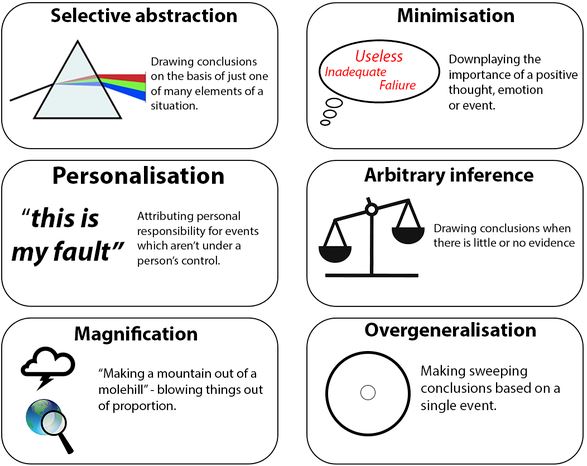
The illustration below highlights some of challenges that people are encouraged to use to help them re-orient their thoughts.
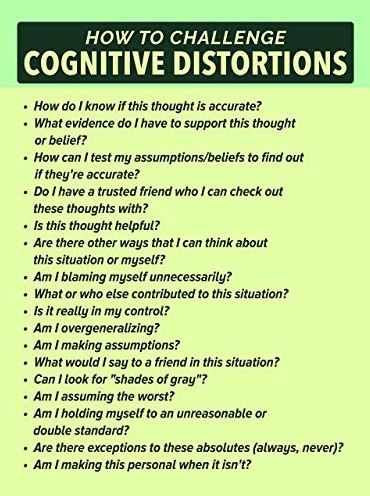
Moving away from the clinical background, our specific focus in this article is the area of decision making in everyday life situations and also in a work and business context.
I want to concentrate now on the work of Charlie Munger who is probably best known as the Vice Chairman of Berkshire Hathaway, Inc and long term business partner of Warren Buffett.
Aside from his extremely successful business career as an investor and his various philanthropic ventures, Charlie Munger is also well known for his thinking skills and especially for his emphasis on developing multiple mental models, identifying and avoiding cognitive distortions and biases to cut through complexity and make good judgement calls and good decisions.
Cognitive Distortions To Avoid When Making Life and Business Decisions
Standard Causes of Human Misjudgment
Here is a summary of some of the main causes of misjudgment. This is taken from: Transcript & Video of a 1995 Charlie Munger speech listing 24 standard causes of human misjudgement which is hosted on the excellent Farnham Street blog and is an easy-to-read presentation and explanation of each of these points and more.
What happens when these cognitive distortions combine?
- Reinforcement and Incentives - under recognition of the power of what psychologists call reinforcement and economists call incentives.
- Psychological denial - reality is too painful to bear, so you just distort it until it’s bearable.
- Incentive-cause bias - the greater the incentive the greater the bias - it’s present in every profession and in every human being, and it causes perfectly terrible behaviour.
- Bias from consistency and commitment tendency, including the tendency to avoid or promptly resolve cognitive dissonance - includes the self-confirmation tendency of all conclusions, particularly expressed conclusions, and with a special persistence for conclusions that are hard-won. The human mind has a big tendency of shutting down on an idea so the next one can't get in.
- Painful qualifying and initiation rituals, pound in your commitments and your ideas. The Chinese brainwashing system, which was for war prisoners, was way better than anybody else’s. They maneuvered people into making tiny little commitments and declarations, and then they’d slowly build. That worked way better than torture.
- Bias from Pavlovian association, misconstruing past correlation as a reliable basis for decision-making. Pavlovian association is an enormously powerful psychological force in the daily life of all of us. And all these psychological tendencies work largely or entirely on a subconscious level, which makes them very insidious. In many cases when you raise the price of alternative products, it’ll get a larger market share than it would when you make it lower than your competitor’s product because of the association of price with quality.
- Bias from reciprocation tendency -One of the reasons reciprocation can be used so effectively as a device for gaining another’s compliance is that it combines power and subtlety. Especially in its concessionary form, the reciprocation rule often produces a yes response to a request that otherwise would surely have been refused.
- Bias from over-influence by social proof, that is, the conclusions of others, particularly under conditions of natural uncertainty and stress. This is a lollapalooza. It describes a psychological and social phenomenon wherein people copy the actions of others in an attempt to undertake behavior in a given situation. Social proof is considered prominent in ambiguous social situations where people are unable to determine the appropriate mode of behaviour, and is driven by the assumption that the surrounding people possess more knowledge about the current situation.
- Bias from contrast caused distortions of sensation, perception, and cognition - the sensation apparatus of people is over-influenced by contrast. It has no absolute scale, just a contrast scale.
- Bias from over-influence by authority - remember the Millgram experiments and also Philip Zimbardo and his infamous Stanford Prison "Experiment"
- Bias from Deprival Super Reaction Syndrome, including bias caused by present or threatened scarcity, including threatened removal of something almost possessed but never possessed - people are really crazy about minor decrements in a downwards direction.
- Bias from envy/jealousy.
- Bias from liking distortion, including the tendency to especially like oneself, one’s own kind, and one’s own idea structures, and the tendency to be especially susceptible to being misled by someone liked.
- Bias from the non-mathematical nature of the human brain in its natural state as it deals with probabilities employing crude heuristics and is often mislead by mere contrast.
- The tendency to overweigh conveniently available information and other psychologically rooted miss-thinking tendencies on this list when the brain should be using simple probability mathematics.
- Mental and organizational confusion from the say-something syndrome - this occurs when people don't have a language or framework with which to explain something and they tend to metaphorically jump up and down and make a lot of noise.
The short answer to this is that the lollapalooza effect kicks in.
What is the lollapalooza effect?
The technical term for this is autocatalysis - for which Munger has coined the phrase the lollapalooza effect.
The lollapalooza effect occurs when two or more forces are all operating in the same direction and often you don’t get just simple addition but rather you get a nuclear explosion once you reach a certain point of interaction between those forces such as a breakpoint or critical-mass is reached.
The
lollapalooza effect can cause huge negative effects but it can also
cause massively positive trade-offs.
Munger give these examples:
- Tupperware parties. "Tupperware has now made billions of dollars out of a few manipulative psychological tricks."
- The Moonies. "Moonie conversion methods. Boy, do they work. He just combines four or five of these things together"
- Alcoholics Anonymous. "A 50% no-drinking rate outcome when everything else fails? It’s a very clever system that uses four or five psychological systems at once toward, I might say, a very good end."
FULL LISTINGS - Cognitive Distortions
Highly recommended:
# "The Decision Lab": FULL LIST & DETAILS on Cognitive Distortions
# Charlie Munger: 24 Standard Causes Of Human Misjudgement
How To Avoid Cognitive Distortions?
- The first and most obvious way is to understand and be fully ware of these cognitive biases and cognitive distortions.
- Understand the power and pitfalls of Heuristics i.e. the mental short cuts that we all use all the time in everyday decisions.
- Understand the forces at play, especially the boundary between knowing what you do know and what you don't know. Understand your Circle Of Competence.
- When making important and significant decisions, invest the time to apply good Thinking Skills to the whole decision making process.
- Pay particular attention to First Principles Thinking and Second Order Thinking
- Understand and apply Mental Models
Reflections and Action Points
Reflections
Recognise distortion patterns
- “Cognitive distortions” are irrational thought patterns that cause you to perceive reality inaccurately.
- Ask: Where in my thinking lately have I jumped to conclusions? Over-generalised? Taken a single negative event as a broad truth?
Check the context of decision-making and business / work life
- Beyond clinical psychology, the article shifts to how distortions affect everyday life and business decisions (via Charlie Munger’s list of “24 standard causes of human misjudgment”).
- Ask: In recent work or life decisions, where might I have let a bias or distortion slip in? Example: “Bias from social proof” → copying what others do under stress.
Explore your “circle of competence” and gaps in thinking
- The article emphasises understanding “what you do know and what you don’t know”.
- Ask: Where am I confident in my thinking vs. where am I operating outside my expertise and relying on shortcut thinking/heuristics?
- Also: What mental-models am I relying on without questioning them?
Mindful awareness of heuristics, mental shortcuts and their traps
- Heuristics are mental shortcuts; fine in many contexts, but they can lead to distortion.
- Ask: When have I used a heuristic (e.g., “always lean on past success”, “if everyone believes it it must be true”) and what cost did it incur?
Notice the interplay of multiple distortions (the “lollapalooza effect”)
- The article describes how multiple biases can align and lead to exaggerated misjudgement.
- Ask: In a recent failure or bad decision, can I trace more than one distortion acting at once (e.g., bias from liking + social-proof + authority + incentive)?
Reflect on your decision making process rather than outcomes only
- The article emphasises process: being “consistently not stupid” rather than trying to be brilliant.
- Ask: What’s my decision-making process? How much time do I invest? Am I using first-principles thinking or second-order thinking?
Action Points
Create a “distortion checklist” for key decisions
- Before major decisions (work, personal, strategic), run through: Have I identified my incentives and how they bias me?
- Am I under influence of social proof/authority?
- Am I using heuristics instead of analysis?
- Am I operating outside my circle of competence? Use this as a mini-audit before finalising.
Build mental-model practice into your routine
- Pick 1–2 mental models (e.g., first-principles, second-order thinking, circle of competence) and apply them weekly to a real scenario.
- Example: Write out “What do I really know? What don’t I know?” for a decision you face. This helps shift from reactive heuristic to deliberate thinking.
Set up a system for reflection post-decision
- After decisions play out (good or bad), ask: What distortions were present? What heuristics did I use? What would I do differently next time?
- Keep a decision-journal (even short entries) with this reflection. Over time you’ll spot patterns.
Limit reliance on shortcuts in high-stakes moments
- Recognise heuristics are fine for low stakes—but risky when stakes are high.
- In high-stakes contexts: slow down, get input, challenge assumptions, map incentives clearly. Example: “What assumptions am I making? Which biases might I ignore?”
Train mindfulness of thought patterns
- Use mindfulness to notice when distortions arise. Simple practice: When you feel strong emotion (anger, anxiety, frustration) ask: Which thought-pattern/am I defaulting to now?
- Recognise: “I’m catastrophising”, “I’m over-generalising”, “I’m relying on authority without question”.
Embed the “process over outcome” mindset in your culture
- For your team or personal workflow: emphasise good decision-making process rather than just hitting deliverables.
- Reward: “We asked the hard questions”, “We challenged our assumptions”, “We identified what we didn’t know” (even if we didn’t succeed).
- This builds resilience and counters distortions that thrive in outcome-only cultures.
Cognitive Distortions - Resources
Recommended Further Reading:
Heuristics & Biases in Military Decision Making by Major Blair S. Williams
Cognitive Bias: Systematic Errors in Decision Making - Harvard Business Review
Articles:
Cognitive Biases
Iatrogenics - "Do Something Syndrome"
Mental shortcuts
Mental Models
Thinking Skills
Productive Thinking
Applied Rationality and The Scout Mindset
Return from "Cognitive Distortions" to: How To Think
LATEST ARTICLES
The Battle For Your Mind - How To Win Inner Freedom In A Digital Age Of Distraction
 From External Events to Inner Events. We often think of “events” as things that happen out there: the traffic jam, the rude comment, the delayed email reply. But what truly shapes our experience is wh…
From External Events to Inner Events. We often think of “events” as things that happen out there: the traffic jam, the rude comment, the delayed email reply. But what truly shapes our experience is wh…How to See Your Thoughts Without Becoming the Story
 A Practical Guide to Thought-Awareness. You can spend your life inside the stories of your mind without ever learning how to see your thoughts clearly and objectively. Most of the stuff we tell oursel…
A Practical Guide to Thought-Awareness. You can spend your life inside the stories of your mind without ever learning how to see your thoughts clearly and objectively. Most of the stuff we tell oursel…The Collison Decision Matrix - A Simple Framework for Better Choices
 The Collison Decision Matrix Is A Practical Everyday Thinking Tool. Most of us spend a surprising amount of time worrying about decisions. From small ones such as what to wear, what to eat, what to te…
The Collison Decision Matrix Is A Practical Everyday Thinking Tool. Most of us spend a surprising amount of time worrying about decisions. From small ones such as what to wear, what to eat, what to te…The Power Of Asking The Right Question
 The Power Of Asking The Right Question Lies In The Quest For Insight. To experience the power of asking the right question you must develop the practice of asking questions. The best way to improve th…
The Power Of Asking The Right Question Lies In The Quest For Insight. To experience the power of asking the right question you must develop the practice of asking questions. The best way to improve th…Site Pathways
 Here is a site pathway to help new readers of Zen-Tools navigate the material on this site. Each pathway is based around one of the many key themes covered on this site and contain a 150 word introduc…
Here is a site pathway to help new readers of Zen-Tools navigate the material on this site. Each pathway is based around one of the many key themes covered on this site and contain a 150 word introduc…How To Live With Contradiction - Beyond Thought Let Stillness Speak
 A major impact on so many peoples' lives is the situational contradiction of unfilled realistic expectations. So where does all this leave us? Well here we are, with mental equipment that is more lim…
A major impact on so many peoples' lives is the situational contradiction of unfilled realistic expectations. So where does all this leave us? Well here we are, with mental equipment that is more lim…How To Trust The Process Of Mindfulness - Right Now
 In mindfulness, the process isn’t some distant goal — it's what is happening right now. When we talk about how to trust the process of mindfulness the credibility of the process is heavily dependent…
In mindfulness, the process isn’t some distant goal — it's what is happening right now. When we talk about how to trust the process of mindfulness the credibility of the process is heavily dependent…Inner Mastery For Outer Impact - Mental Clarity For Effective Action
 Insights only matter if they translate into consistent action. In a world crowded with quick fixes and motivational soundbites, the theme “Inner Mastery for Outer Impact” calls us to something more e…
Insights only matter if they translate into consistent action. In a world crowded with quick fixes and motivational soundbites, the theme “Inner Mastery for Outer Impact” calls us to something more e…The Wise Advocate - Helping You Achieve The Very Best Outcome
 The focus of your attention in critical moments of choice either builds or restricts your capacity for achieving the best outcome. When we talk of 'The Wise Advocate' its easy to think of the consigl…
The focus of your attention in critical moments of choice either builds or restricts your capacity for achieving the best outcome. When we talk of 'The Wise Advocate' its easy to think of the consigl…Trust The Process - Beyond The Cliche
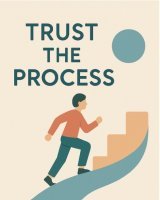 The phrase "trust the process" has become a cliche, the woo-woo mantra of the "self help" industry. Those three little words feel like they ought to mean something useful but hidden behind them are a…
The phrase "trust the process" has become a cliche, the woo-woo mantra of the "self help" industry. Those three little words feel like they ought to mean something useful but hidden behind them are a…The Dopamine Delusion - Why Anticipation Beats Achievement
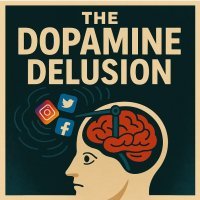 The thrill we feel is not in the having, but in the wanting. The more we have, the more we want. The more things we acquire and the easier things get for us, the more discontent we feel. The more spo…
The thrill we feel is not in the having, but in the wanting. The more we have, the more we want. The more things we acquire and the easier things get for us, the more discontent we feel. The more spo…The Power Of Silence Is Experienced In Your Use Of Language
 Practise the "Beneficial Neurological Delay" for optimal comprehension. The power of silence is experienced in your use of language, specifically: - How you formulate the words you use to think and in…
Practise the "Beneficial Neurological Delay" for optimal comprehension. The power of silence is experienced in your use of language, specifically: - How you formulate the words you use to think and in…

